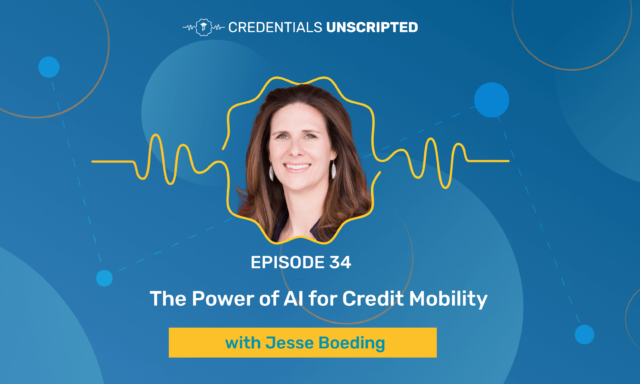
Higher Ed
The Power of AI for Credit Mobility
We use cookies to help you navigate efficiently and perform certain functions. You will find detailed information about all cookies under each consent category below.
The cookies that are categorized as "Necessary" are stored on your browser as they are essential for enabling the basic functionalities of the site. ...
Necessary cookies are required to enable the basic features of this site, such as providing secure log-in or adjusting your consent preferences. These cookies do not store any personally identifiable data.
Functional cookies help perform certain functionalities like sharing the content of the website on social media platforms, collecting feedback, and other third-party features.
Analytical cookies are used to understand how visitors interact with the website. These cookies help provide information on metrics such as the number of visitors, bounce rate, traffic source, etc.
Performance cookies are used to understand and analyze the key performance indexes of the website which helps in delivering a better user experience for the visitors.
Advertisement cookies are used to provide visitors with customized advertisements based on the pages you visited previously and to analyze the effectiveness of the ad campaigns.
Other cookies are those that are being identified and have not been classified into any category as yet.

Online degree programs open the possibility of a college education to a wider pool of students, which is why schools have pushed them heavily in recent years. After all, online courses allow professionals to earn an advanced degree without sacrificing their careers. That ability to work while enrolled means younger students, who may not have been able to afford living expenses while going to school, can support themselves and an education at the same time. Further, online degree programs allow out-of-state students to attend their dream institutions without uprooting their lives.
Unfortunately, a handful people are still skeptical of online college courses, likening them to the dubious practices used by many for-profit institutions. Schools must be aware of this unwarranted yet prevailing mindset, and they can use digital credentials to further shift the tide and show online programs are a great option for everyone.
For-profit schools helped to pioneer the online degree movement and with a few of these institutions gained a reputation for taking students’ funds without providing anything valuable in return. Students and parents, of course, became wary of losing their money with nothing to show for it, so they grew wiser in their evaluations of quality online schools.
Employers shared this stigma at the time. A 2012 survey from The Chronicle of Higher Education found the majority of businesses labeled the idea of hiring a graduate with a bachelor’s degree from an online college as “undesirable.”
Yet, the tide is turning, and quality online offerings from reputable schools have convinced learners and employers that online degrees are just as valid as their in-classroom counterparts. An article from U.S. News and World Report noted that employers are very aware of the increase in delivery and quality, and many rely on accreditation rather than the on- versus offline nature of the program to determine the strength of a candidate’s degree.

(Ironically, some of the last holdouts are teachers. As recently as 2017, only 11 percent of college and university faculty members strongly agree that for-credit online courses are, at minimum, equal to their in-person counterparts, according to research from Inside Higher Ed. Digital learning leaders are, of course, more likely to strongly agree, but what’s most interesting is that educators of all types think the online programs at their schools are more likely to provide a quality education than those at other colleges.)
Indeed, U.S. News & World Report’s 2018 list of top online programs has several notable institutions on it, including Temple, Columbia and Carnegie Mellon. It’s clear that these schools wish to increase access to a quality education and give students the tools they need regardless of their location or other life commitments.
These postsecondary institutions see what students and employers understand but some educators have yet to grasp: Online degree programs can be a great tool to help learners find success. Yet there’s one thing schools forget to advertise when they promote online programs: the verified digital credential.
Despite a few lingering misgivings, online education is clearly here to stay. Programs are getting better and more efficient each year, and they bring the opportunities brought on by a quality education to many more people. Over time, online degree programs will become increasingly important as the knowledge economy evolves, as they’re a way for schools and educators to improve upon their commitment to students.
And although viewpoints have shifted in the past few years, online degree program enrollment still lags behind in-person, despite having more flexibility. Clearly, schools need to add something more when promoting their online programs. That something is a verified digital credential.
After all, the main point of contention surrounding online degree programs is that they aren’t as good as others. But a verified credential turns that viewpoint on its head. It’s an endorsement from the school that the student is competent in specific areas and prepared to take the next step toward their goals. And since the degree program is online, shouldn’t students also have digital access to their credentials?
It may not boost enrollment overnight, but verified digital diplomas can provide the final bit of assurance students, parents, teachers and employers need to fully trust online degree programs.
To learn more about how digital diplomas and credential innovations helps learners pursue their opportunities, contact Parchment today.
